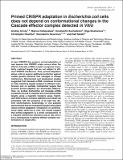Primed CRISPR adaptation in Escherichia coli cells does not depend on conformational changes in the Cascade effector complex detected in vitro
Abstract
In type I CRISPR-Cas systems, primed adaptation of new spacers into CRISPR arrays occurs when the effector Cascade-crRNA complex recognizes imperfectly matched targets that are not subject to efficient CRISPR interference. Thus, primed adaptation allows cells to acquire additional protection against mobile genetic elements that managed to escape interference. Biochemical and biophysical studies suggested that Cascade-crRNA complexes formed on fully matching targets (subject to efficient interference) and on partially mismatched targets that promote primed adaption are structurally different. Here, we probed Escherichia coli Cascade-crRNA complexes bound to matched and mismatched DNA targets using a magnetic tweezers assay. Significant differences in complex stabilities were observed consistent with the presence of at least two distinct conformations. Surprisingly, in vivo analysis demonstrated that all mismatched targets stimulated robust primed adaptation irrespective of conformational states observed in vitro. Our results suggest that primed adaptation is a direct consequence of a reduced interference efficiency and/or rate and is not a consequence of distinct effector complex conformations on target DNA.
Citation
Krivoy , A , Rutkauskas , M , Kuznedelov , K , Musharova , O , Rouillon , C , Severinov , K & Seidel , R 2018 , ' Primed CRISPR adaptation in Escherichia coli cells does not depend on conformational changes in the Cascade effector complex detected in vitro ' , Nucleic Acids Research , vol. 46 , no. 8 , pp. 4087-4098 . https://doi.org/10.1093/nar/gky219
Publication
Nucleic Acids Research
Status
Peer reviewed
ISSN
0305-1048Type
Journal article
Description
Skoltech Ph.D. program in the Life Sciences (to A.K.); European Research Council consolidator grant [GA 724863 to R.S].; NIH [R01 GM10407] and Russian Science Foundation [14-14-00988] grants to K.S.; UMNIK grant 8115GU/2015 to O.M., and institutional support from Skoltech to K.S. Funding for open access charge: Skolkovo Institute of Science and Technology internal funding.Collections
Items in the St Andrews Research Repository are protected by copyright, with all rights reserved, unless otherwise indicated.

